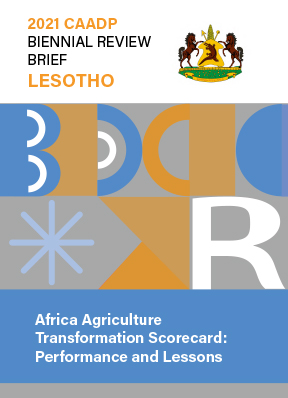Africa Agriculture Transformation Scorecard: performance and lessons. Lesotho
Abstract
The Malabo Declaration on accelerated agricultural growth and transformation for shared prosperity and improved livelihoods is a set of goals that were adopted by Heads of State and Government of the African Union in 2014 in Malabo, Equatorial Guinea (AUC 2014). To translate the seven Malabo commitments into results, a call for action was made by the Heads of State and Governments, by calling upon the AU Commission and the NEPAD Planning and Coordinating Agency, in collaboration with partners, to initiate a review process to be conducted on a biennial basis starting 2017, with an objective of tracking, measuring, and reporting progress towards achieving the Malabo Declaration commitments by 2025.
Three Biennial Reviews (BR) have been conducted—the inaugural BR in 2017, the second BR in 2019, and the third and most recent BR in 2021. This brief draws on the third BR report to summarize the performance of Lesotho in pursuit of the seven Malabo Declaration commitments. It assesses the challenges faced and the lessons learned by the country.
For the third BR, the benchmark score, the minimum score for a country to be considered on track to achieve the Malabo Declaration commitments by 2025, was 7.28 (AUC 2021). Lesotho achieved an overall performance score of 3.98 in the third BR. This score, which is far below the benchmark, indicates that the country is not on track to meet the Malabo commitments by 2025.
A key recommendation from the analysis is for the government to improve on the BR Process by putting in place inclusive institutionalized mechanisms for mutual accountability and peer review in the agricultural sector. The country should also improve its capacity for evidence-based planning, implementation, and monitoring and evaluation. To do so, Lesotho must increase funding to support increased data generation, management, analysis, and utilization in the agriculture sector.

